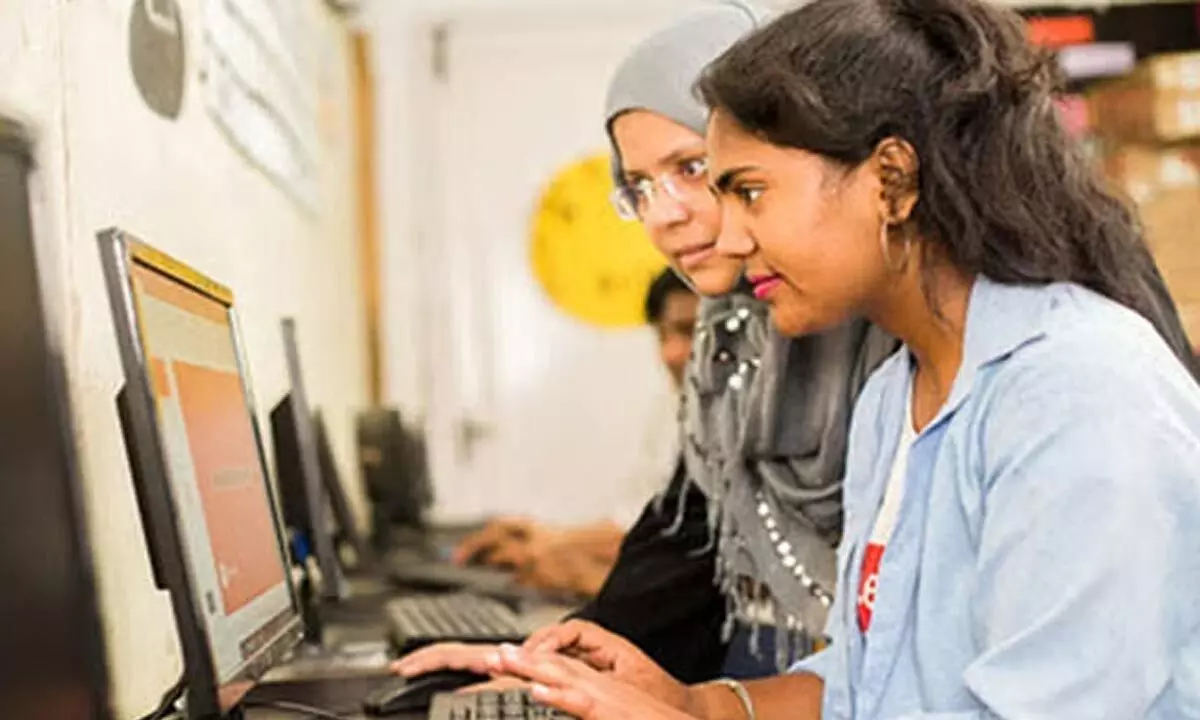Live
- NABL-QCI appoints Dr. Sandip Shah as chairperson
- Centre transfers Rs 2.23 lakh crore for 1,206 schemes under Direct Benefit Transfer
- BGT 2024-25: Watching Konstas bat reminds me of Symonds, says Hayden
- 75 iconic lighthouses in India saw more than 10 lakh visitors till September
- Societal inequality may reduce brain health: Study
- United Cup: Rybakina, Shevchenko clinch mixed doubles to seal Kazakhstan's win over Spain
- Samagra Shiksha Employees Intensify Strike, Demand Job Regularization in Telangana
- My uncle was always a family man: Manmohan Singh’s nephew
- 71 Smart Cities develop 9,433 smart classrooms in 2,398 govt schools: Report
- New cruise season opens at NMPA!
Just In
Digital vocational skilling can make youths workplace ready


Digital vocational skilling can make youths workplace ready
Digital and vocational skilling is typically the cornerstone of any economy.
Digital and vocational skilling is typically the cornerstone of any economy. And although India is considered to be a hotbed of knowledge and skills, the vast majority of its youth lack what can be termed as the employability quotient. Many experts say the country’s employability problem is a bigger challenge than unemployment itself.
The National Education Policy 2020 has set the framework for deep educational reform, particularly in higher education with emphasis on technical and soft skills among graduates and postgraduates. The Government is also focusing on digitization, to create a skill development ecosystem for creating a proficient workforce and augment livelihood opportunities for the young India.
India is one of the youngest nations in the world with over 50% of the population under 30 years. The widening youth population brings upon the policy makers a responsibility to provide adequate opportunities to convert the demographic advantage into a demographic dividend. India is progressively moving towards a knowledge economy, and it is imperative to transform the large workforce into an adaptable and flexible skilled workforce which is responsive to the changing job environment.
As a leading implementing NGO, Magic Bus India Foundation ensures access to youths from underserved communities who are NEET (Not in Education, Employment or Training) facing the risk of exclusion or struggling with long term employment by bridging the skill gap in digital vocational skilling in India. The organization strives to digitally empower and facilitate industry oriented vocational training to the youth from low-income strata so that they can access opportunities for growth and well-being for self and family. Educators have started moving beyond their traditional role of teachers and have started acting as facilitators. This allows them to assist students in discovering and developing their own unique learning processes.
Digital vocational training will be relevant today and, in the future, as it will help address a range of social issues from poverty to unemployment to inequality. By providing vocational training programs through digital means, it will help equip individuals attain the right skill sets and knowledge that they need to secure employment, start their own businesses, and improve their economic prospects.
Magic Bus India Foundation is one of the first movers in innovation, updation and upgradation of the skilling curriculum by partnering with various corporate responsibility brands and government to support access towards skilling young people and ensure that it is industry-oriented and relevant to the current job market. The organization’s partnership with National Skill Development Corporation as an implementation partner and one of the first NGOs in India’s first-ever Skill India Impact Bond is providing livelihood skilling to youths, of which 80% are women.
Their mission is to empower young people of India in digital vocational training for the future is possible through a long-standing collaboration with AWS/restart, NIIT, Accenture, Cognizant, S&P Global. They also help youth become first-generation salary earners in their families. The organization also enhances employability by imparting life skills and employability skills through the regular ‘Youth Skilling’Programme and ‘Connect with Work’programme that supports young people to sustainable livelihood opportunities in sectors such as Retail, ITeS, Hospitality and BFSI. It also provides youth with sector-specific training, job placements and post-placement support.
It was founded in 1999 and is one of the top five NGOs in the education and skilling space in India. They equip adolescents and young people with life skills and knowledge that enable them to thrive in the transition from childhood to livelihood.
In the past two decades, the Childhood and Livelihood Programs have positively impacted the lives of over 1 million adolescents and helped place 195,963 youths into job. The Adolescent programs operates in 24 states and 72 districts, with 51% participation rate of girls and the Livelihood programs in 13 states also achieve an impressive 55% girl participation. In our Childhood Program, we prioritize instilling life skills and enhancing education through 302 Community Learning centers and 2770 connected schools. Livelihood Programme focuses on enhancing employability by providing specialized skill training, connecting young individuals to sustainable livelihood opportunities. This is achieved through 95 Livelihood Centers and
825 Colleges, offering sector-specific training, job placements, and post-placement support.

© 2024 Hyderabad Media House Limited/The Hans India. All rights reserved. Powered by hocalwire.com






